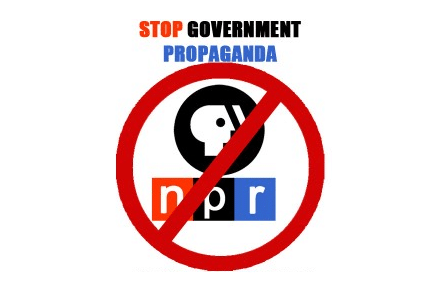By Rick Manning
The Public Broadcasting System (PBS) and National Public Radio (NPR) are quitting Twitter (sort of.) Their problem is that the social media platform has labelled the two entities as “government-funded media” and they don’t like it. And in response, they have vowed to not publish fresh information to their 11 million combined followers.
How dare the Elon Musk owned Twitter engage in hate speech against these two taxpayer-supported organizations? To accurately inform the readers that they each receive a significant amount of their revenues from the federal government is apparently an egregious slap in the face.
But hiding behind initials and fancy logos to avoid disclosing that each is a government-funded entity doesn’t really square with the idea of disclosure.
Besides every two years, these ‘news’ agencies very publicly make the case as to why hundreds of millions of taxpayer dollars should flow into their coffers.
NPR and PBS act as if there are not about a dozen news and talk television shows on full-time over cable representing diverse points of view along with streaming services, podcasts and over the air broadcast radio and television. In 2023, our nation is chock full of information about news events of the day with commentary provided from every part of the political spectrum. The only distinguishing characteristic of NPR and PBS is that they are sucking up hundreds of millions of federal taxpayer money while their competitors have to attract advertisers. In fact, a good case can be made that private sector liberal talk radio stations and networks have failed as a direct result of competition from the government-favored mouthpieces.
NPR’s angst over their Twitter designation is all the more ironic given their website’s description of their federal government funding dependency, where they write, “Federal funding is essential to public radio’s service to the American public and its continuation is critical for both stations and program producers, including NPR.”
Congress should embrace this sudden PBS and NPR decision to disavow their federal government dependency by ridding them of the burden of receiving taxpayer dollars. After all, more than a decade ago, when Americans for Limited Government worked with U.S. Rep. Doug Lamborn (R-Colo.) in his attempt to defund the Corporation for Public Broadcasting, investigative journalist James O’Keefe did a controversial, undercover video in 2011 with then NPR fundraising executive Ron Schiller who later resigned, stating that, “[F]rankly, t’s very clear, we would be better off in the long-run without Federal funding.”
At the time he opposed getting rid of it, he explained his thoughts on why NPR would be better off without federal funding: “I think for independence, number one. Number two is that our job would be a lot easier if people weren’t confused about, because we get federal funding, a lot of Americans, a lot of philanthropists actually think we get most of our money from the federal government, even though NPR, as you know gets 1 percent and the station economy as a whole gets 10 percent.”
Schiller added, “NPR would survive and most of the stations would survive” without federal funding.
Schiller was right. A study by these public broadcasting entities shows that only about 15 percent of public television stations’ funding comes from federal taxpayers and about 10 percent of public radio stations’ budgets is from the federal government. NPR is even less dependent with less than 1 percent of NPR’s budget coming from the federal government, and meanwhile it benefits from an endowment of more than $300 billion.
Now, that NPR and PBS are shunning the “government-funded media” label, it is time for Congress to end the archaic notion that official government sponsored media has a role. Every government agency has numerous public relations people seeking to get the word out about their activities both directly through general media and through stakeholder networks. Agencies have studio production capacity, highly trained production staff and captive journalists who report specifically on their agency.
This doesn’t even mention the lapdogs of the dominant establishment media who will breathlessly repeat every attempt at reining in the constantly growing administrative state as a threat to the future of the nation.
Mr. Lamborn, please reintroduce your legislation from last session to amend the Communications Act of 1934 to prohibit Federal funding for the Corporation for Public Broadcasting after fiscal year 2023. The time is now for its passage as two of the major beneficiaries of this funding are ashamed of it. It may only be about $600 million out of our nation’s annual expenditure of more than $6 trillion a year, but this less than 0.01 percent cut in spending may be the first drop in Congress’ bucket to fiscal sanity.
Rick Manning is the President of Americans for Limited Government.
Corrected: Cutting the Corporation for Public Broadcasting budget would be less than 0.01 percent of the total budget, not 0.1 percent.







